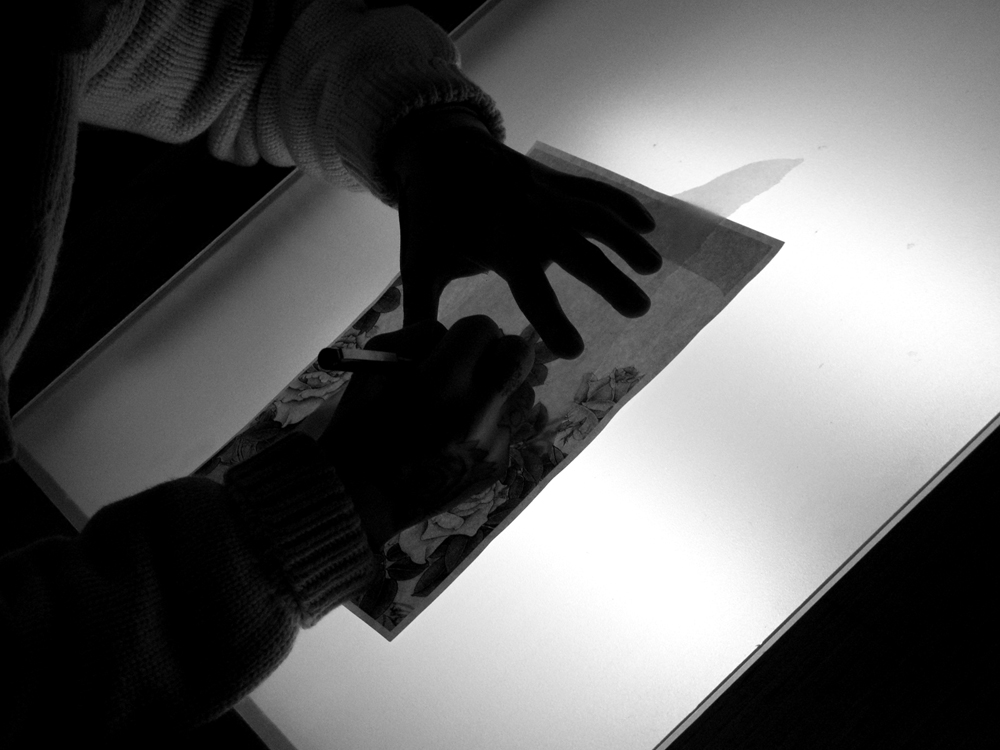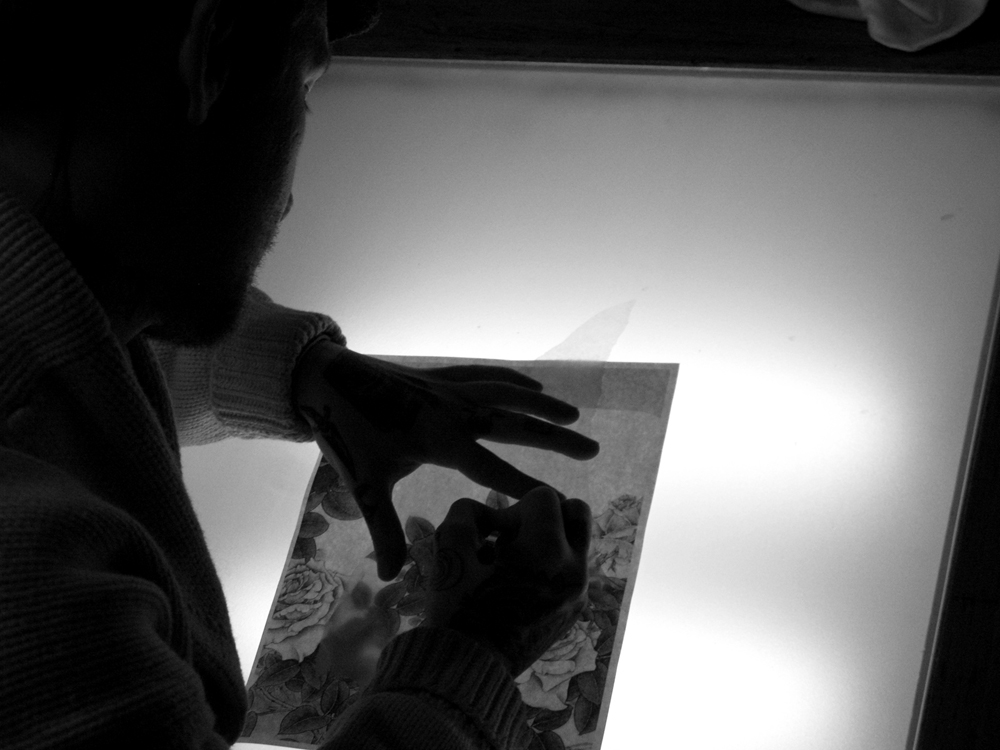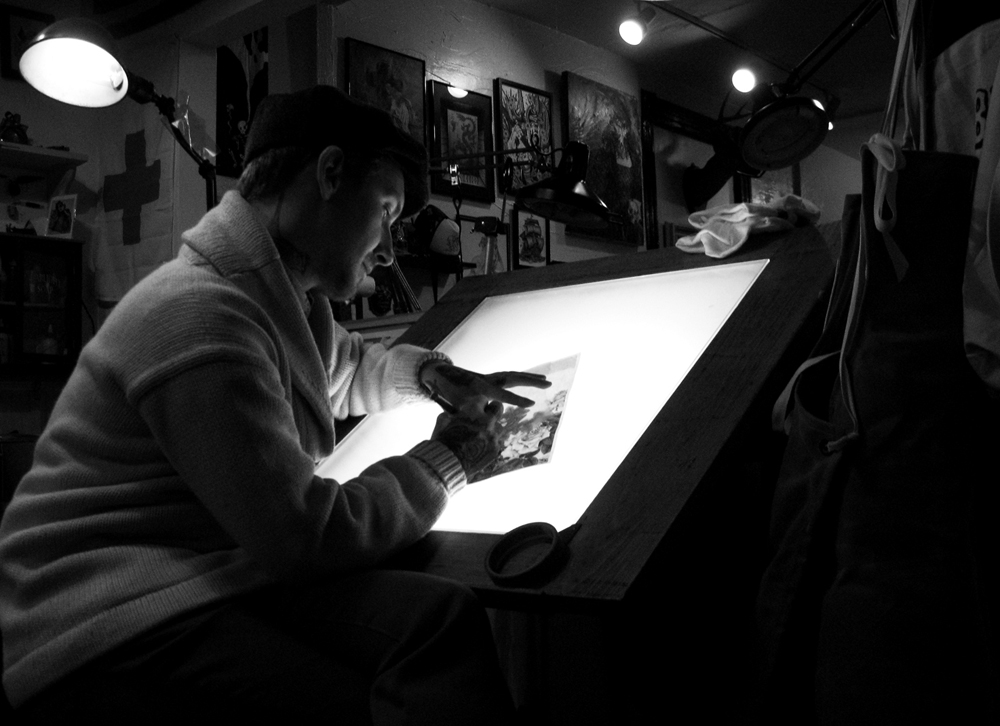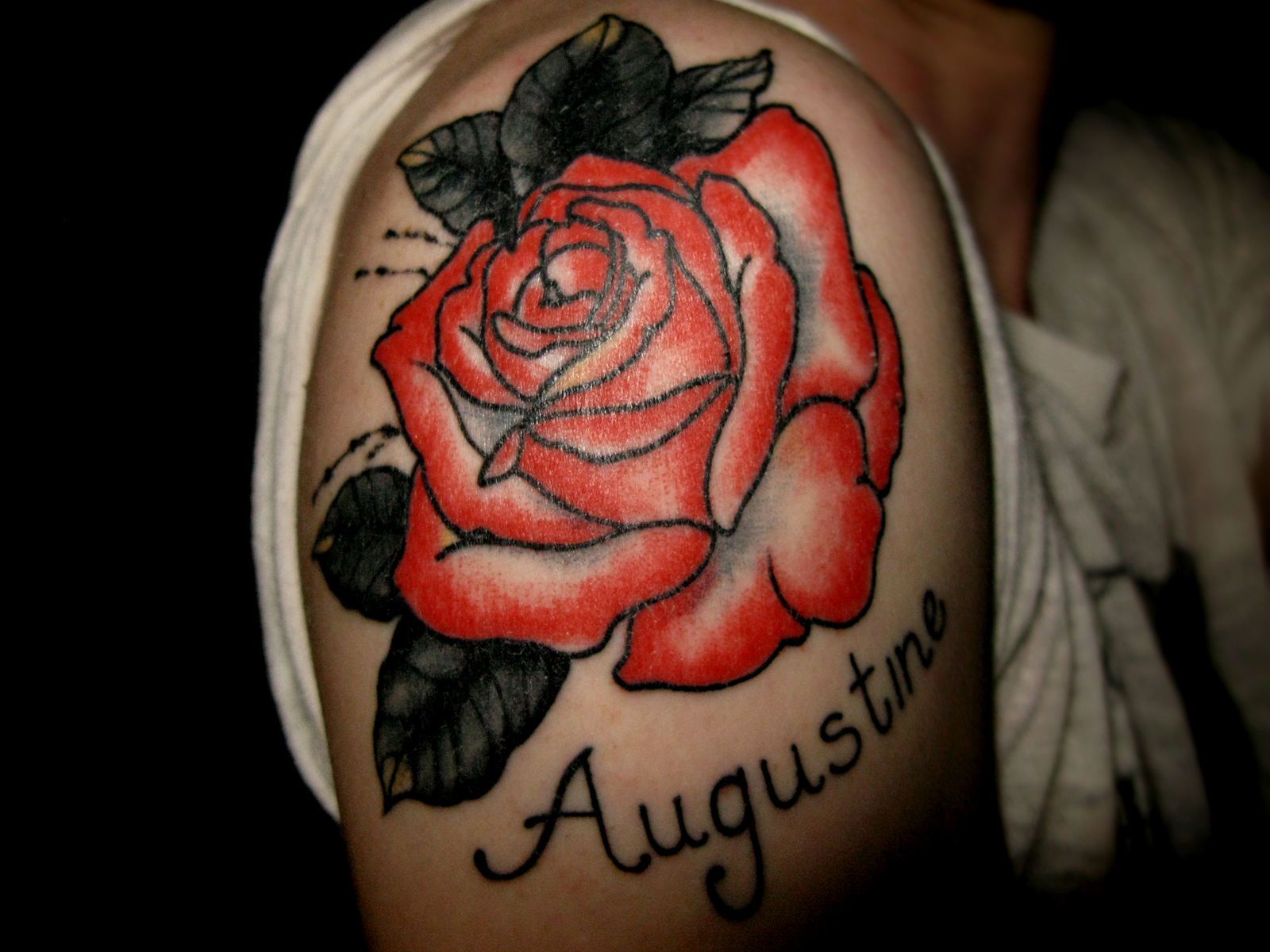The ubiquitous proliferation of tattoos in today’s mainstream culture has peeled away all but every layer from the archaic notion that tattoos are taboo. Tattoos, let’s face it, have become commercialized. But if you dig your hands through the pile, you’ll find a new tattoo niche that harks back to the good ol’ days. A time of pre-world war industrial bliss…where hands were busy and sweat glistened proudly. It was a time when things weren’t necessarily easy, but you got the work done and didn’t quite worry about the unending mystery of the ever expanding universe. It was an era where tattoos were an earned folk art tradition. For sailors, long odysseys into uncharted hemispheres granted coveted sparrows, like badges, and crudely drawn women with seductive eyes are scrawled three layers deep into flesh to memorialize debauched, forgotten nights in remote tropical isles. Today, there is a new band of misfit tattooists keeping this tradition beautifully alive. Last Monday I got a chance to sit down to talk with tattooist Cris Cleen.
When I got to Idle Hands Tattoo, in the Lower Haight neighborhood of San Francisco, he was hunched over an angled draftsman table sketching intently. Like an author of a novel would give a name that alludes to a character'sphysicality or persona, Cris Cleen was....well...very clean and well dressed – dapper even. His style of dress is a throwback to a distant, nostalgic era. It’s the era you see in black and white photographs of 1930s street hoodlums, bootleggers, and dust bowl wanderers. I should mention though, that Cleen is far from a Luddite, even though I could smell small whiffs of Ned Ludd. I learned that Cleen has “three computers and an iphone.” Cleen also recognizes the disadvantages of that era: “lights caused fires and people threw their trash out the window.” But there is still a soupcon of romantization of an earlier era, which seems not only nostalgic, but also appreciative of the bygone ethos of the American Dream. Even the brief story he told about himself, his brother and their mother moving out west from Iowa to California seemed very Steinbeck. But all this simply added to the splendorous aesthetic and personality of his tattoos: folksy, like patchwork quilts.
Cleen has never been to art school and never wanted to be an artist. Even now he doesn’t consider himself an artist: “I like to come up with ideas and put things together… I’d rather have a good idea than a good drawing.” At one point Cleen wanted to become a cop – a revelation that illustrates the merit of his character – something about cops having “the guts to defend something.” And Cris Cleen certainly is protecting something: his integrity. Cleen is not a people pleaser and has never had a problem speaking his mind: “I don't want to be suicidal when I'm 30 because I've been a people pleaser all my life.” Whilst most kids “were fucking off and spending their parents money” Cleen, in his early 20s, had a career – he started tattooing right after he turned 19. Cleen doesn’t really know what drew him to the world of tattoos, he had “no frame of reference,” but admits that after seeing flash art for the first time he became fixated. Cleen mentioned that something about the random smattering of images, the “dichotomy of a skull and a rose next to each other,” sold him right away. You could say that tattoos were Cris Cleen’s calling.
Cris Cleen appreciates the “folk sensibility” of tattoo art and theorizes that the commercialization of tattoos has made them too polished, and that “over stylization is dead.” Cleen likes to stick to stuff “that’s always going to be beautiful…like roses and girls.” In that sense, Cleen is a constant pursuer of timelessness. He sees tattoos like permanent jewelry…adornment, not defamation of the flesh. Cleen stays up late into the night working on his drawings for his clients. He doesn’t try to appeal to the “tattoo collector,” but to the “every man” who simply wants a beautiful tattoo. And Cleen doesn't like that the tattoo world overplays the working class persona. Cris Cleen is not a working class hero. Cleen considers himself more a part of an elite trade of craftsmen more than anything. Which brings us back to the new niche aesthetic of the misfit tattooist: here in the second decade of the 21st century there is a full on revolt against some of the most common iniquities in the annals of tattoo history, like tribal tattoos and Geiger inspired machinery. Cleen mentioned some of his influences, which date back to the turn and early 20th century, from whence he culls a lot of his inspiration, like Saturday Evening Post and pre-Norman Rockwell illustrator J.C. Landecker and Norman Lindsey, the Australian artist who was ostracized for the overtly sexual nature of his art, and for living with more than one woman. For Cleen, in art, there is a certain power and lust. What is male desire? The countenances of the woman depicted in Cleen’s tattoos all have an underworld quality…. as if they live in a dark velvet room in a constant state of indecency…disrobed…. sprawled out and ravaged.
Last Monday was my sister’s 25th birthday. Cris Cleen and I, after a weeklong email thread that stretched into twenty or so messages, decided upon simple design: a simple rose. When I got to the shop I asked him to put my sister’s name below the rose and he obliged. The tattoo came out beautifully. Cris Cleen’s tattoos are like precious permanent keepsakes…
Cris Cleen will be tattooing New York at Saved Tattoo during the month of March and back at Idle Hands Tattoo in San Francisco after that. Text & Images by Oliver Maxwell Kupper.






